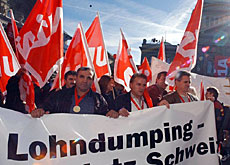
Left challenges EU labour accord

Some sections of the Left have joined in calls for a referendum against opening the Swiss labour market to the ten new European Union member states.
Switzerland’s biggest labour union, Unia, is due to vote on the matter on Saturday. But delegates are expected to come out against a referendum.
In December parliament voted to extend the bilateral accords on the free movement of people to the ten new EU-member countries, most of which are in eastern Europe.
The far-right Swiss Democrats have already said that they will mount a ballot box challenge to the accord – a move supported by the rightwing Swiss People’s Party.
But after also threatening to challenge the protocol, trade unions have announced that they would not oppose parliament’s decision.
Union leaders said they were satisfied with additional measures decided by parliament to prevent wage dumping and defend workers’ rights. Parliament approved last year the appointment of 150 inspectors to monitor the labour market.
Guarantees
“The package is limited, but in our opinion it provides workers with sufficient guarantees,” said Unia co-president Renzo Ambrosetti.
Unia, along with the Swiss Federation of Trade Unions and Travail Suisse, has therefore dropped the idea of pushing for a referendum.
But Ambrosetti cautions that Unia’s support has its limits.
“Our commitment to the campaign for the extension of the right of the free movement of people will go only so far as the cantons’ and employers’ commitment to implementing the supporting measures,” he told swissinfo.
Disagreement
There are, however, those on the Left who do not agree with the position of the union leaders.
A committee made up of extreme-left activists and some Unia members has launched a referendum campaign, claiming that the additional measures are a “farce”.
It believes that to avoid wage dumping, companies should be forced to make public the wages and social-security contributions paid to foreigners.
Fears that the accord will lead to downward pressure on wages are at their highest in the border cantons, particularly in French-speaking Geneva and Italian-speaking Ticino.
In Geneva, the referendum campaign is being supported by the Alliance de Gauche. But another organisation, SolidaritéS, has withdrawn its support because it believes that a “no” vote would damage the interests of immigrants.
In Ticino, support comes from the cantonal branch of Unia.
“At the conference on Saturday, we shall be defending the idea of holding a referendum,” confirmed Saverio Lurati, the secretary of Unia Ticino.
Answers
“Our experience in the workplace tells us that workers are demanding answers to the downward pressure on wages caused by the free movement of people,” Lurati told swissinfo.
“Unless the unions respond sensitively, many workers will end up in the arms of the xenophobic Right,” he added.
For Lurati, the measures adopted by parliament are inadequate.
“150 inspectors for the whole of Switzerland will not be enough to monitor the state of the labour market,” he said.
“And there are no measures to tackle the problems associated with temping agencies and the self-employed.”
But even Lurati admits that the likelihood of Unia agreeing to support the referendum is virtually zero, and he says that his Ticino branch will respect the decision of the majority.
For his part, Ambrosetti says the referendum’s supporters are mistaken in thinking that a “no” to the free movement of people will solve the problems of wage dumping and the dismantling of the welfare state.
“A ‘no’ vote would play into the hands of the xenophobic Right, who are the first to attack the welfare state,” said Ambrosetti.
“I get the impression that the promoters of the referendum are fighting an ideological battle.”
swissinfo
The accord governing the free movement of people came into force last June as part of the first set of bilateral agreements between Switzerland and the EU.
An additional protocol calls for the inclusion of the ten new EU member states into this agreement.
The first bilateral accords cover 11 issues from taxation to agriculture, but the labour accord is the most controversial.

In compliance with the JTI standards
More: SWI swissinfo.ch certified by the Journalism Trust Initiative


















![The four-metre-long painting "Sonntag der Bergbauern" [Sunday of the Mountain Farmers, 1923-24/26] had to be removed by a crane from the German Chancellery in Berlin for the exhibition in Bern.](https://www.swissinfo.ch/content/wp-content/uploads/sites/13/2025/12/01_Pressebild_KirchnerxKirchner.jpg?ver=1ea8acae)










You can find an overview of ongoing debates with our journalists here . Please join us!
If you want to start a conversation about a topic raised in this article or want to report factual errors, email us at english@swissinfo.ch.